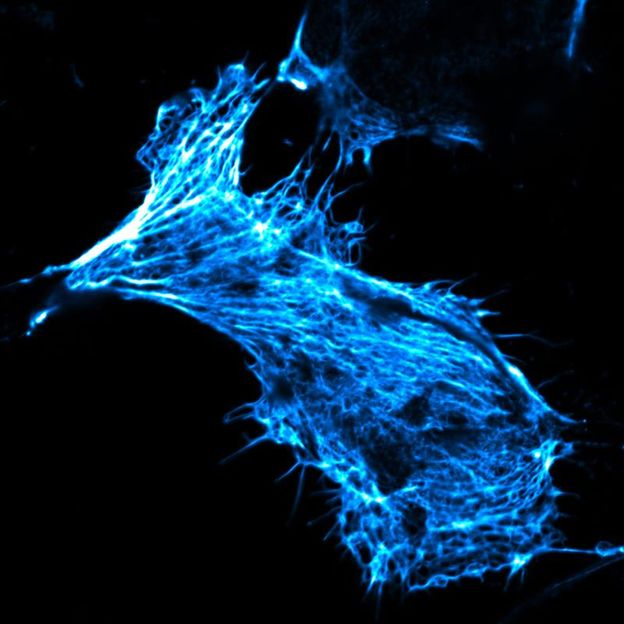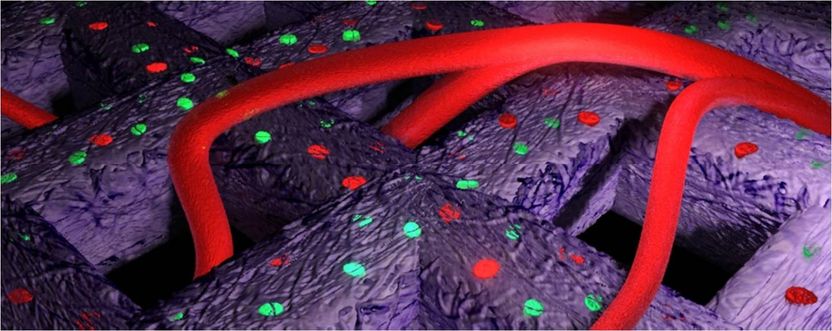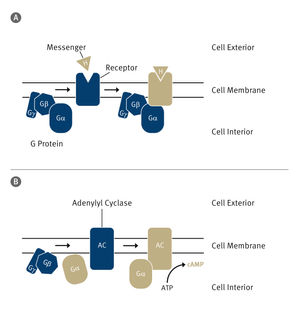Newly developed, bioinspired cell delivery vehicles
A research team headed by chemist Prof Bart Jan Ravoo and biochemist Prof Volker Gerke has designed nanocontainers made of sugar and protein components. These containers are taken up by cells through natural processes and can thereby transport substances that normally cannot penetrate the cell membrane – such as drugs or labelled substances for the investigation of cell functions – into cells. The study was published in “Advanced Science”.

Living human cancer cell in cell culture, its actin skeleton stained with fluorescent phalloidin. This toxic substance was only able to enter the cell by means of the newly developed nanocontainers.
Kudruk & Pottanam Chali et al./Adv Sci 2021 (modified colours)
Nanocontainers can transport substances into cells where they can then take effect. This is the method used in, for example, the mRNA vaccines currently being employed against Covid-19 as well as certain cancer drugs. In research, similar transporters can also be used to deliver labelled substances into cells in order to study basic cellular functions. To take advantage of their full potential, scientists are conducting intensive research into how nanocontainers interact with biological environments and how they have to be chemically constructed to deliver cargo into cells in the gentlest and most controllable way possible.
Scientists at the University of Münster have recently developed a new type of nanocontainer that is constructed entirely from biological components. Unlike other cargo transporters, these are not based on lipids but on sugar compounds which are sealed with a shell of protein structures – so-called polypeptides – the thickness of which is precisely tailored. “We do produce the components of our nanocontainers synthetically, but they are taken up by cells and – due to the overall structure we have developed – also degraded by them just like naturally occurring substances,” explains chemist Prof Bart Jan Ravoo. “For the degradation of the container shell inside the cell, we make use of two naturally occurring mechanisms – as a result, the transported substances are released rapidly, as soon as they arrive in the cell,” adds biochemist Prof Volker Gerke.
The scientists want to use the tiny nanocontainers, which are about 150 nanometers in diameter, to load cells with labelled biologically relevant lipids that can be used to study transport processes occurring within the cell membrane. In addition, they plan to further develop the chemical design of the containers in such a way that they are, for example, only taken up by certain types of cells or only release their cargo when stimulated by external light. In the future, transport systems built from sugar and protein components might also be suitable for applications in living organisms to deliver drugs specifically into certain tissues and cells. The study was published in the journal “Advanced Science”.
Original publication
Original publication
Kudruk S, Pottanam Chali S, Linard Matos AL, Bourque C, Dunker C, Gatsogiannis C, Ravoo BJ, Gerke V. "Biodegradable and Dual-Responsive Polypeptide-Shelled Cyclodextrin-Containers for Intracellular Delivery of Membrane-Impermeable Cargo."; Adv Sci (Weinh). 2021.
Organizations
Other news from the department science

Get the life science industry in your inbox
By submitting this form you agree that LUMITOS AG will send you the newsletter(s) selected above by email. Your data will not be passed on to third parties. Your data will be stored and processed in accordance with our data protection regulations. LUMITOS may contact you by email for the purpose of advertising or market and opinion surveys. You can revoke your consent at any time without giving reasons to LUMITOS AG, Ernst-Augustin-Str. 2, 12489 Berlin, Germany or by e-mail at revoke@lumitos.com with effect for the future. In addition, each email contains a link to unsubscribe from the corresponding newsletter.
Most read news
More news from our other portals
Last viewed contents

3-D bioprinted human cartilage cells can be implanted
Novartis announces typhoid vaccine research program in partnership with the Wellcome Trust - New grant from the Wellcome Trust funds progression of vaccine from preclinical through Phase I and II studies with view to protect against both S. Typhi and S. Paratyphi strains

Merck Reports Strong Third Quarter - In comparison with the year-earlier quarter, Group net sales increased by 9.7% to € 4.4 billion
Breakthrough: Gut bacteria drive growth of stem cells in colon cancer


















































